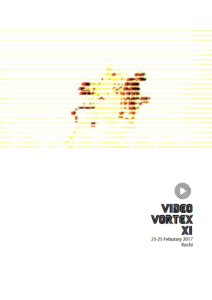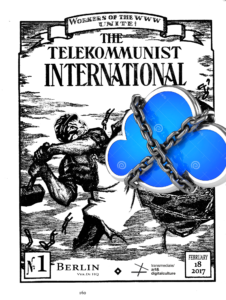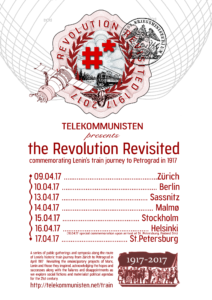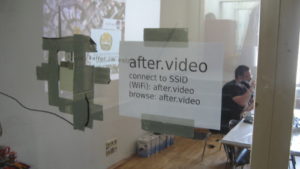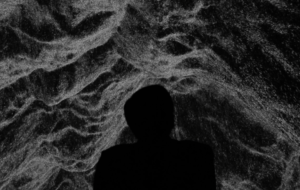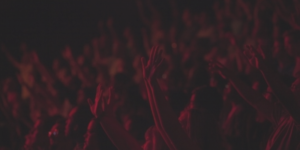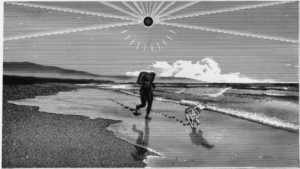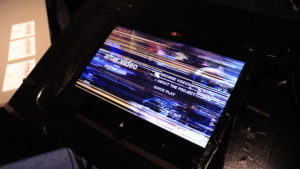Video technology has radically altered the ways in which we produce, consume and circulate images, influencing the aesthetics and possibilities of moving image cultures, as well as yielding a rich body of scholarship across various disciplines. Given its ease of access and use, video has historically been aligned with media activism and collaborative work, further enabled by digital platforms, that facilitate transnational networks even as they exist within heightened systems of surveillance. Having emerged as the driving force behind the web, social media, and the internet of things, video, as Ina Blom (2016) suggests, is endowed with life-like memory and agency. As witnessed in the recent network crash in America as a result of the hacking of web cameras, video overload can even become a cause for infrastructural vulnerability. While the infrastructures of video in Europe and America may almost be taken for granted, in many parts of the global South, video exists across uneven conditions, and this invites engagements with video history and theory that are attentive to these varied lives and forms of video. Video Vortex XI proposed to place emphasis on these ‘other’ video cultures, which have largely evaded scrutiny under the fiction of video’s universalism.
Author: adnan
Algorave @ Transmediale – ever elusive
This year we took our Digital Media students from Coventry University to an exchange with Digital Media students from Leuphana Unviersity to Berlin, during the Transmediale Festival. A student excursion as a collaboration between Leuphana University, Coventry University and transmediale whereby students from the digital media bachelor programs of both schools can engage with the content of the festival while also having space and time for guided reflection, led by the organising faculty and invited guests, in the period of February 2nd through February 5th, mixing groups of digital media bachelors students from
Leuphana University and Coventry University. The aim will be for students to engage with the festival activities while having moments to reflect theoretically, artistically and technically with the material at hand.
I made a note of the following sessions at Transmediale:
Material Flows: Rafts and Bodies at Sea
Starting from the project Plastic Raft of Lampedusa (by YoHa, 2016–17), featured in the exhibition “alien matter,” this session discusses moments where technical objects such as watercraft and human life becomes inseparable. By dismantling the type of rubber boat used by refugees for crossing the Mediterranean, the project addresses an underexplored space where technical objects and human bodies historically and contemporaneously conjoin and merge into new entities. Placelessness is contrasted with the forms of governance, materials, and technical standards that have the power to hold a body afloat or allow it to drown. It is an extreme metaphor for our relationship to digital technologies, where bodies emerge that are in transversal collaboration with technical objects and the administrative machinery of advanced capitalism. This is not a project that is concerned with the morals of the European migrant crisis, nor is it an attempt to re-invoke the sublime of European aesthetics. This project is about a plastic boat whose journey takes place in the sea’s lack of fixity, the space between different state actors and scales of administrative discipline.
YOHA–PLASTIC RAFT OF LAMPEDUSA
As part of the special exhibition “alien matter” at Haus der Kulturen der Welt, The DAZ (Deutsches Architektur Zentrum) hosts the disassembled rubber raft of _Plastic Raft of Lampedusa_ by artist duo YoHa. In their work, the artists explore the circulation of economic, material, and human flows that have a mutual influence on one another. 2–8 FEBRUARY 2017, DAILY 15:00–20:00 Deutsches Architektur Zentrum DAZ Köpenicker Straße 48/49, 2. courtyard, 10179 Berlin
www.daz.de
TRACING INFORMATION SOCIETY–A TIMELINE
In collaboration with the Technopolitics working group, transmediale presents the exhibition “Tracing Information Society–a Timeline” at neue Gesellschaft für bildende Kunst (nGbK). Technopolitics turns the
exhibition venue into a curated space for knowledge. A twelve-meter-long timeline depicts the development of the Information Society from 1900 until today.
The concept of machines generally describes an assemblage of parts assigned to an overall function, designed by a human. Yet, the entwined histories of science, technology, and art are filled with ideas about nature functioning like machines, and of visions where machines become “natural” and organic. These two paths seem to merge as machines increasingly communicate autonomously and operate in fields beyond human perception and influence. Can we devise new perspectives for understanding the elemental machines that now seem to operate contingently within hybrid techno-ecologies like the forces of nature? What are the new aesthetic and political affordances or subjectivities involved in the process of technology becoming environmental?
Becoming Infrastructural – Becoming Environmental
What does the infrastructural and environmental becoming of technology really mean? Which economic, cultural, and geopolitical factors become apparent when we overcome the purposeful dematerialization of media? How can new infrastructural imaginaries, escaping anthropocentrism, embrace a different understanding of the role and impact of technology today? To address these questions, different emerging ecologies and multiple paradigms become the starting point for a keynote conversation. Lisa Parks examines entanglements of the natural with the technological, and presents the unknown use, adoption, and interruption of infrastructural sites by nonhuman species, pointing towards new conceptualizations for their uses beyond the human. Erich Hörl approaches “environmentality” as a new contemporary condition, discussing how within this new “General Ecology,” we must take into account the environmental becoming, not only of technology, but also of power, thinking, and the world itself. The keynote conversation explores the challenges and limitations of this new infrastructural and environmental condition.
The event features new artistic research into messy, disperse ecologies, which characterize planetary life, as it is re-constructed in flows of data, capital, and natural resources. In order to make the underlying planetary systems more tangible, the micro- and macro-political will be connected and the problematics of scale are brought to the foreground through the projects Mycelium Network Society and Shift Register.
Mycelium Network Society, a brand new network initiative situated in a post-internet mudland, diverts the pursuit of magic mushroom, from a state of hyper-hallucination to collective fungal consciousness, and investigates the fungi culture, its network capacity to communicate and process information.
Shift Register is a research project investigating how human media, technological and infrastructural activities have marked the earth. It investigates and renders legible the material evidence of human activities on earth, registering these not as indicators of human achievement, but as ambiguous negotiations and signposts of planetary exhaustion.
Friendly Fire: What Is It to Re-think Radical Politics, Today?
In light of recent political events like Brexit and the Trump victory, the Left must re-think its approaches. The rise of Right-wing populism is transforming the arena of conflict, struggle, and antagonism, marking it with increasingly xenophobic and nationalistic politics. How can the Left question and understand this arena anew? Is there an emergent politics, which can design effective forms of organization and confrontational strategies, and extend the logics of political communication? How should the Left reconsider radical agendas and strategies? And how can it effectively adjust trajectory and mobilize forces to confront the increasingly hostile, cynical, and polarized social, economic, and political terrain? Central to this new terrain is a rapid re-articulation of relationships between the masses, communities, movements, infrastructures, and media, both old and new. This panel reflects on the role of digital media in the political field, the data infrastructure of the public sphere, and a politics of re-collectivity that reexamines conflict and struggle as progressive forces in democracy.
This panel is a cooperation between Berliner Gazette and transmediale and launch for the Berliner Gazette annual project FRIENDLY FIRE
Hegemonic Media and Their Opponents
Persistent inequalities continue to prevail on the dark side of today’s powerful media platforms. Companies like Facebook and Google possess the power to shape ideologies, beliefs, and desires by offering a range of services from providing Internet access to supplying infrastructures for the accumulation and organization of information. The panel will discuss emerging forms of digital colonialism while looking into various examples of opposition and resistance. Can we confront the subtle and hidden forms of this new cultural hegemony? Who are (or aren’t) the new digital subalterns? Focal points of discussion include the defeat of Facebook’s Free Basics service in India, the politics of the Google Cultural Institute, and new transcultural forms of resistance.
Immediate & Habitual: The Elusiveness of Mediation
With the increased networking of our digital world, media technologies—once stable apparatuses of communication—have dissolved into new ecologies. Being composed of and affected by human and nonhuman actors, users and machines, fleshy bodies and digital objects, such media ecologies overcome previously conceived separations and dichotomies between culture and technology. How does this ongoing yet unnoticeable shift transform our everyday life? And what renders the processes behind media technology today so elusive? During this keynote conversation, two prominent Media Studies scholars shed light on these questions from different angles. Richard Grusin emphasizes the role of a new immediate, radical, and ubiquitous form of mediation that transcends communication, affecting future-oriented events. Wendy Chun stresses the importance of the habitual character of media technologies today, through which media becomes part of our lives, and in reverse our lives become part of a new technological culture.
Middle Session: The Elemental Middle
As media steadily melt into the environment, they become both more naturalized and estranged in the sense that we understand the way they work less and less. The “Elemental” Middle Session highlights the unnoticeable media we live and work among, focusing equally on their material (technical) properties and their cultural meanings. Rather than relying on the worn-out critical mechanisms of “revealing what lies beneath” or “exposing hidden truths,” the discussion focuses on de-naturalization and re-familiarization. Speakers discuss areas of infrastructural intersection and entanglement, identifying ways in which structures of power reinforce each other through ubiquitous media. What are the “elemental” substrates of contemporary media? Is it helpful or possible to try and reduce a complex ecosystem of human and nonhuman actors to its elementary particles?
From the time of the famed Turing test until today, humans have engaged with different forms of artificial intelligence, drawing comparison to possibilities of the human brain. The role of the human, capable of complex processes that machines cannot perform, has often been to intervene and secure proper functioning of machine learning systems. In today’s entangled condition, with examples of bots tweeting as humans, filtering and moderating news content, or as high frequency traders defining financial flows, it is increasingly difficult to tell who or what is acting. Is it possible to locate and comprehend the role and function of nonhuman actors? Which old and new approaches are might be of use? What would it take and what would it mean to stop anthropomorphizing computers and obtain a machinic point of view?
A singularity is a point in space-time of such unfathomable density that the very nature of reality is brought into question. Associated with elusive black holes and the alien particles that bubble up from quantum foam at their event horizon, the term ‘singularity’ has also been co-opted by cultural theorists and techno-utopianists to describe moments of profound social, ontological, or material transformation—the coming-into-being of new worlds that redefine their own origins. Panelists contend with the idea of singularities and ruptures, tackling transformative promises of populist narratives, and ideological discrepancies that are deeply embedded in art and design practices. By reflecting on Afrofuturism and digital colonialism, they will also question narcissistic singularities of ‘I,’ ‘here,’ and ‘now’, counter the rhetoric of technological utopias, and confound principles of human universality.
Strange Ecologies: From Necropolitics to Reproductive Revolutions
In this keynote conversation Steve Kurtz and Johannes Paul Raether explore the less visible or even unacknowledged territories associated with the politics of death and reproduction in the Capitalocene. The impact of excessive human influence on life and our planet’s environments frame most progressive discussions about ecology today, simultaneously making the world both naturalized and denaturalized. Humans are typically treated as a dangerous alien force upsetting the balance of nature, and a force of reduction in terms of diversity and complexity in nature. At the same time, humans have long known that life and the environment are not balanced, nor do they have any necessary direction or purpose. Situated in the middle of strange ecologies, the challenge is to confront the full spectrum of power mechanisms and politics behind our environmental and evolutionary thinking. Through two talks and a conversation, Steve Kurtz and Johannes Paul Raether address the environment, death, and the practices, ethics, and politics of reproduction, questioning their contradictions and paradoxes.
Thanks to C-Base we had the perfect location for this series of student workshops during the Transmediale Festival. The Program was as follows:
THURSDAY, FEB 3
Presentations by Future Design City Feb 2, 15:00 – 16:00 @ C-Base Towards Urban Interactions The rise of computation embedded into objects, walls, and buildings introduces a new paradigm for the way humans interact with their environments. How will we design the relationship between people and such connected spaces? How might interactive systems scale across everyday human experience? And which new opportunities and challenges could appear, when we imagine future cities as networks of overlapping, dynamic data points?
Bio Andreas Rau
Andreas Rau is an interaction designer, creative coder and jazz pianist based in Berlin. As co-founder of the Institute for Urban Interactions, he researches the interplay of people and their environments in emerging interactive spaces. His concepts and prototypes aim to create meaningful experiences across the physical and digital worlds, always questioning the relationship between the two.
www.andreasrau.eu
www.urbaninteractions.org
Live Code and Live Algorithms – Feb 2, 16:00-18:00 @ C-Base
A showcase of work by students of the course on Live Coding and Live Algorithms given at Leuphana University this past semester. Thirteen students will perform short live or algorithmic music sets they have been creating over the past weeks. Performances by (in no particular order): Kai Man Wong | Sebastian Ganschow | Lucas Wolf | Nico Hampl | Jan Brinkmann | Franziska Henne | Henri Nehlsen | Santi Colombatto | Hannah Keymling | Anna-Maria Dickmann | Kajetan von Hollen | Kersten Benecke | Daeun Jeon
CTM 2017 – Fear Anger Love Feb 2, 22:00 – 05:00 Berghain/Panoramabar
Berghain | Disturbance: Actress | DJ Stingray | Moor Mother | SKY H1 | Yally [Raime] Panorama Bar | Heat: ENDGAME | Mechatok | mobilegirl | Virgil Abloh 02. Februar 2017 | Doors: 21 Uhr / 9 pm | Start: 10:00 pm | Eintritt ab 18 Jahre! / x-rated Please respect our no-photos policy
FRIDAY, FEB 3
ACTIVITIY STREAM A:
TidalCycles Workshop – Feb 3, 12:00-17:00 @ C-Base led by Alex McLean & Alexandra Cardenas
TidalCycles (or Tidal for short) is a language for live coding patterns of events in time. It allows you to make musical patterns with text, describing sequences and ways of transforming and combining them, exploring complex interactions between simple parts. Tidal does not make sound itself, but is designed for use with the SuperDirt synth, and can control other synths over Open Sound Control or MIDI. This workshop will explore the expressive power of the Tidal language as a way of generating and performing musical sequences. Tidal is a very intuitive language, and thus should be accessible to total beginners using the built-in sound material Tidal provides. For those with experience in SuperCollider, you’ll be happy to know that Tidal can be used as a sequencing language for all the sophisticated synths and sample playback mechanisms you’ve created in SuperCollider. https://tidalcycles.org/
PREPARATIONS FOR THE WORKSHOP
It is important that all students attending this workshop bring a laptop and install all the pre-requisite software in advance. This means you need to install Haskell, Atom, SuperCollider (3.7 or later) and
Git.
For installation instructions use the following links:
Installation instructions for Mac Users https://www.youtube.com/watch?v=dJTfGv2sT-w
Installation instructions for all platforms https://tidalcycles.org/getting_started.html
ABOUT THE WORKSHOP LEADERS
Alex McLean (UK) has been active across the digital arts since the year 2000, including live coding music, and software art for which he won the Transmediale award in 2002. Alex co- founded the TOPLAP and Algorave movements, and has collaborated widely including as part of Slub, Canute, aalleexx, and xynaaxmue. He completed his PhD thesis on Programming Languages for the Arts at Goldsmiths London, during which time he initiated the free/open source live coding environment TidalCycles, connecting code and music to create a rich approach to pattern making. Alex is based between Sheffield UK, and the research institute in the Deutsches Museum in Munich, where he uses live coding techniques to explore the ancient thought processes of textile weavers, for the European project PENELOPE lead by Ellen Harlizius-Klück. He releases his solo music as Yaxu on the Computer Club label, including the EP Peak Cut and forthcoming album Spicule. He curates the Festival of Algorithmic and Mechanical Movement, and is co-editing the Oxford Handbook on Algorithmic Music with Roger Dean, due out during 2017. yaxu.org
Alexandra Cardenas (CO) is a composer, programmer, and improviser of music born in Bogotá, Colombia in 1976. She studied composition at the Universidad de Los Andes where she also carried studies in mathematics and classical guitar. Using open source software like SuperCollider and TidalCycles, her work is focused on the exploration of the musicality of code and the algorithmic behavior of music. Alexandra is among the pioneers of live coding in electroacoustic music and part of the forefront of the Algorave scene. Currently, she lives in Berlin, Germany, and is doing her masters in Sound Studies at the Berlin University of the Arts. cargocollective.com/tiemposdelruido
ACTIVITIY STREAM B:
Exhibition Tour – Feb 3, 12:30-17:30
To facilitate reflection, we ask the organisers of transmediale for a spacewhere the students can convene at specific times on a daily basis with the faculty from Coventry and Leuphana, as well as guests invited from the festival roster. For this we would only need a room to convene in at a specific time each day.
The students at Leuphana will have had a course on live coding performance and be able to contextualize and deeply appreciate the artists who perform during the Algorave events put forth in the second proposal of this package.
While the younger group of students from Coventry will be able to experience this event as an expose of what is artistically possible with code. The more advanced students from the Leuphana group will have the option to perform their work during the early slot of the proposed Algorave night.
1 – Critical Constellations of the Audio-Machine in Mexico
Kunstraum, Mariannenplatz 2 12:30
This year’s exhibition takes as its focus the history and current state of electronic music and sound art in Mexico, guiding visitors through the various different musical styles and sound experiments that have emerged in the country since the beginning of the 20th century. Curated by sound researcher Carlos Prieto Acevedo, the exhibition features work by a number of active members of the Mexican sound art community, including Ariel Guzik, Angélica Castelló, Guillermo Galindo, Roberto Morales Manzaneres, Verónica Gerber, Mario de Vega and Carlos Sandoval. Talks and performances featuring Mexican music from the last 20 years as well as reworks and reconstructions of pieces from the beginnings of experimental music in Mexico link the exhibition to a larger international context
2 – Primitives
HAU2, Hallisches Ufer 32 15:00
Alan Warburton’s “Primitives” installation will be on display during the festival week, free of charge, exploring the intersection of entertainment and science using cutting-edge CGI “crowd simulation” software. This technology is normally used in Hollywood blockbuster films to fill out cities, stadiums and battlefields and also by researchers and engineers working in crisis mapping, city planning and events management. Warburton’s AV project explores this simulation software to “liberate the digital crowd” and allow it to live and explore more experimental parameters.
3 – On the Far Side of the Marchlands
Schering Stiftung, Unter den Linden 32-34 16:30
The exhibition “On the Far Side of the Marchlands” at Schering Stiftung explores the potential of radically new topographies through border regions (marchlands) created by the artists, composed from inextricably linked realms of experience, culture, and materiality. The 3D Additivist Cookbook, conceived and edited by Morehshin Allahyari and Daniel Rourke, is the point of departure for the exhibition, bringing together radical projects by over one hundred artists, activists, and theorists.
Algorave – Feb 3, 20:00 - 00:00 @ HKW
Algorave embraces the alien sounds of raves from the past, and introduce alien, futuristic rhythms and beats made through strange, algorithm-aided processes. It’s up to the good people on the dance floor to help the musicians make sense of this unstable situation and do the real creative work in making a great party. These days just about all electronic music is made using software, but with artificial barriers between the people creating the software algorithms and the people making the music. Using systems built for creating algorithmic music and visuals, these barriers are broken down, and musicians are able to compose and work live with their music as intricate processes. Algorithmic music is no new idea, but Algorave focuses on humans making and dancing to music. Algorave musicians don’t pretend their software is being creative, they take responsibility for the music they make, shaping it using whatever means they have. More importantly the focus is not on what the musician is doing, but on the music, and people dancing to it. Organized in collaboration between transmediale, Alex McLean, Alexandra Cardenas and Jonathan Reus, the Algorave at this year’s transmediale is the first event of its kind in Berlin. It is a kind of “coming home”, a celebration of transmediale’s history of supporting the early development of live coding since the early 2000’s, as well as celebrating how far live coding has come as a practice since then. With sets by: Alexandra Cardenas & Camilla Vatne Barratt-Due (CO/NO) | Alex McLean (UK) | coï¿¥ï3⁄∕4¡pt (UK) | La verbena electronica (ES) | Belisha Beacon (BE) | Fredrik Olofsson (DE) (visuals) | Miri Kat (UK) (visuals)
ORGANISERS
Jonathan Reus-Brodsky (Leuphana University, DE)
Jonathan Reus-Brodsky is an American composer-performer whose musical work blends machine aesthetics with free improvisation. In 2009 Jonathan received a Fulbright Fellowship to conduct research into computationally-mediated music systems at the Studio for Electro-Instrumental Music (STEIM) in Amsterdam. Afterwards he worked at STEIM as a curator, research coordinator and educator. He is a founding member of the Instrument Inventors Initiative performative media collective based in The Hague. He is lecturer for Computational and Coded Cultures at Leuphana University, Lüneburg.
Adnan Hadzi (Coventry University, UK)
Adnan Hadzi undertook his practice-based PhD onFLOSSTV – Free, Libre, Open Source Software (FLOSS) within participatory TV hacking Media and Arts Practices’ at Goldsmiths, University of London. Adnan’s research focuses on the influence of digitalization and the new forms of (documentary-) film production, as well as the author’s rights in relation to collective authorship.
Rob Canning (Coventry University, UK)
Rob Canning is a composer and performer with a research focus centred around networked creativity and open working methodologies. His recent work explores possible interplays between performers and network delivered instruction sets; these range from traditional ensemble pieces which utilise browser based net-scores to simultaneous network streamed sonic drifts as in his Streamscape project.
PROFILE OF STUDENT GROUPS
The organizing faculty from Leuphana and Coventry will each bring a group of approximately 25 students to participate in the excursion. Leuphana University, Bachelors Major of Digital Media
The Major of Digital Media bachelors at Leuphana University aims to educate students to have a wholistic view of the digital as it exists in its myriad formations in science, culture and aesthetics. The program originates out of a joint cooperation between the Digital Cultures Research Lab and Institute for Culture and Aesthetics of Digital Media. Students receive a mixed course load from diverse teachers in computer science, history and epistemology of computing, software studies, creative coding, digital art, electronic music, net critique and similar topics. The group attending the excursion will be in their 3 rd year of study in the new digital media major, and have already completed much of the above coursework. The excursion will serve as the culmination of a hands-on seminar on livecoding and computer music.
Coventry University, Digital Media Bachelors
The group of Digital Media students from Coventry will be in their first year of study, and therefore be extremely new to digital cultures and creative use of digital media. We see the pairing of these students with the more advanced group from Leuphana as an ideal informal mentorship situation.
REFLECTION SPACE
In order to facilitate daily theoretical discussions around the experiences of the festival, we ask that transmediale provide a meeting space once per day for the organising faculty and the student groups to convene. The space should provide adequate seating for up to 50 students, a video projector and stereo sound.
ALGORAVE SHOWCASE
SYNOPSIS
We propose an Algorave showcase night as part of transmediale’s activities for 2017 – organized in collaboration between transmediale, Jonathan Reus-Brodsky, Alex McLean and Alexandra Cardenas, artists from the live coding scene who are eager to realize Berlin’s first Algorave as a celebration of transmediale’s history of supporting the early development of live coding since the early 2000’s. Next to the main Algorave club night we also propose a possible mini-symposium and public live coding workshops.
PROPOSAL
We propose an Algorave club night as part of Transmediale’s activities for 2017. The Algorave will be the first event of its kind in Berlin, and will be organized in collaboration between transmediale, live coding pioneer Alex McLean, Mexican live coder/composer Alexandra Cardenas and American live coder/instrumentalist Jonathan Reus-Brodsky. The Algorave showcase at transmediale’s historic 30 year anniversary comes out of a desire to celebrate transmediale’s history of supporting the early
development of live coding since the early 2000’s. In this way, the Algorave at transmediale is a kind of coming home, a celebration of how far live coding has come as a practice and a focal point for thinking where it may go. Along with the club night, we propose a mini-symposium and public workshops around the Genesis and Cultures of live coding.
The students from Leuphana University described in the student excursion proposal of this package will have just had a course on live coding performance and be able to contextualize and deeply appreciate the artists who perform during this event, and hopefully participate as part of an early slot during the club night.
ORGANISERS
Jonathan Reus-Brodsky (Leuphana University, DE)
Jonathan Reus-Brodsky is an American composer-performer whose musical work blends machine aesthetics with free improvisation. In 2009 Jonathan received a Fulbright Fellowship to conduct research into computationally-mediated music systems at the Studio for Electro-Instrumental Music (STEIM) in
Amsterdam. Afterwards he worked at STEIM as a curator, research coordinator and educator. He is a founding member of the Instrument Inventors Initiative performative media collective based in
The Hague, and teaches as lecturer for Computational and Coded Culture at Leuphana University, Lüneburg.
Alexandra Cardenas (MEX/DE)
Alexandra Cardenas is a Colombian composer and improviser based in Berlin, who has followed a path from Western classical composition to improvisation and live electronics. Her recent work has included live coding performance, including performances at the forefront of the Algorave scene.
Alex McLean (UK)
Alex McLean is a software artist, live coding musician and researcher based in Sheffield UK. He is active in the live coding community, including creating the live-coding environment TidalCycles, an co-founding the TOPLAP and Algorave movements. He has performed widely since the year 2000 in several collaborations including Slub with Dave Griffiths and Adrian Ward, Canute with Yeeking (Rephlex), and aalleexx with Alexandra Cardenas. Alex performs solo as Yaxu, releasing music on the Computer Club label, including Peak Cut EP which Bleep.com described as a “.. polyrhythmic and hyperreal strand of techno .. showcased on cuts like Public Life and Cyclic showing that he is not just testing the confines of how music can be consumed but also how genres can sound.” He won the Transmediale Software Art award in 2001, the British Science Association Daphne Oram Award Lecture in 2015, and is sound artist in residence at the Open Data Institute during 2016. He is currently
co-editing the Oxford Handbook on Algorithmic Music with Roger Dean.
ALGORAVE CLUB NIGHT
We propose a club night featuring a showcase of some of the top artists from the Algorave scene, presenting a whole night of live coded electronic dance music and presented in collaboration with
Alexandra Cardenas and Alex McLean . The club night ideally begins early (7pm), with an early slot
for the more advanced students of Leuphana University’s digital media program to perform with
their work from the previous semester’s seminar on live coding. After the early slot we transition
into a full club evening with the featured artists, going late into the night. Leuphana University is
able to contribute towards the fees of the artists, as they will also participate in more intimate
encounters with the students.
VENUE & TECHNICAL REQUIREMENTS
• A medium-sized dance venue with loud stereo sound system
• Multiple projectors & projection screens for visualists and projection of code.
• A long standing-height table where multiple artists can set up simultaneously.
• It will be necessary to have a sound technician for the evening.
ARTIST TRAVEL & FEES
• Leuphana University is able to provide fees for a limited number of invited artists in so far as
they provide guest tutoring/mentorship for the student groups.
• transmediale provides assistance with artist travel and lodging costs.
DOCUMENTATION OF PAST ALGORAVES
Algorave article in Wired
• http://www.wired.co.uk/article/algorave
Algorave at OCCII, Amsterdam
• http://motherboard.vice.com/nl/read/algorave-coden-in-de-club
Algorave at Leeds Digital Festival, 2016
• https://www.youtube.com/watch?v=NTBMHE1Tj48&feature=youtu.be&t=33m11s
Canute at Algorave Karlsruhe 2015
• https://www.youtube.com/watch?v=uAq4BAbvRS4
LONG LIST OF ARTISTS MUSICIANS
• Jonathan Reus-Brodsky (US/NL) + Colin Hacklander (US/DE)
• Alexandra Cardenas (MEX/DE)
• Alex McLean (UK)
• Renick Bell (JP)
• Hlodver Sigurdsson (IS)
• Alberto de Campo (AT/DE)
• Frederik Oloffson (SW)
• Benoit and the Mandelbrots (DE)
• Shelly Knots + Jo Anne = ALGOBABEZ (UK)
• Nick Collins (UK)
• Thor Magnusson (UK)
• The Void* (NL)
• Till Bovermann (DE)
• Luuma (UK)
• Sean Cotterill (UK)
• Calum Gunn (UK)
• Polinski (UK)
• Belisha Beacon (UK)
• Anny (UK)
• Lil data (UK)
VISUALISTS
• Jack Rusher (DE)
• Francesca Sargent (chez) (UK)
• Dan Hett (rituals) (UK)
• Antonio Roberts (hellocatfood) (UK)
ALGORAVE WORKSHOPS AND MINI SYMPOSIUM
Taking advantage of the high caliber of invited artists, we propose the possibility for doing one or two public workshops related to live coding and Algorave. And potentially a small symposium or panel discussion on the Genesis & Cultures of Livecoding. The workshops and mini-symposium follow a successful similar format to those presented in Amsterdam during their Algorave events in 2014. Two workshops from that event, an introduction to SuperCollider and a more advanced workshop of livecoding with live instruments could be presented, as well as a possible workshop on Alex McLean’s Tidal environment, which is beginner friendly and would potentially appeal to a larger public audience.
POTENTIAL WORKSHOPS
• Intro to SuperCollider
• http://www.codedmatters.nl/workshop/learn-basics-sound-synthesis-supercollider/
• SuperCollider & Live Instruments
• http://www.codedmatters.nl/workshop/supercollider-live-instruments/
• Intro to TidalCycles
• http://tidalcycles.org/
• Link to mini-symposium held in Amsterdam
• http://www.codedmatters.nl/workshop/algorave-mini-symposium/
SPACE & TECHNICAL REQUIREMENTS
• A medium-sized workshop space with tables and chairs
• stereo sound system
• projector/screen
Throughout the run of the festival, excursions, and closing weekend, around 180 international thinkers and cultural producers will reframe the question of the role of media today through panels, performances, workshops and screenings.
FESTIVAL 02.–05.02.2017 [1]
transmediale’s new publication _ACROSS & BEYOND – A TRANSMEDIALE READER ON POST-DIGITAL PRACTICES, CONCEPTS, AND INSTITUTIONS_ is out now! This collection of art and theory analyzes today’s post-digital conditions for critical media practices–moving across and beyond the analog and the digital, the human and the nonhuman. The contributions also look across and beyond the field of media art, staking out new paths for understanding and working in the transversal territories between theory, technology, and art.
In the keynote conversation _Becoming Infrastructural – Becoming Environmental_ (Fri, 03.02.2017, 18:00), LISA PARKS and ERICH HÖRL discuss entanglements between nature and technology, where infrastructural sites are interrupted by nonhuman species and a “General Ecology” of new power
structures emerges.
WENDY CHUN and RICHARD GRUSIN talk about mediation beyond the media and the habitual patterns of immediate communication in the keynote conversation _Immediate & Habitual: The Elusiveness of Mediation_ (Sat, 04.02.2017, 18:00).
In the keynote conversation _Strange Ecologies: From Necropolitics to Reproductive Revolutions_ (Sun, 05.02.2017, 18:00), STEVE KURTZ and JOHANNES PAUL RAETHER explore unacknowledged territories amid the politics of death and ethics of reproduction in the Capitalocene, questioning their
contradictions and paradoxes.
transmediale and CTM Festival [2] will feature _LEXACHAST_, a collaboration between PAN label founder BILL KOULIGAS and futuristic sound design duo AMNESIA SCANNER. The performance introduces a mangled dystopian soundtrack that revolves around generative live-streaming visuals by artist Harm van den Dorpel (Fri, 03.02.2017, 21:00).
Another highlight is the screening of _THE SPRAWL (PROPAGANDA ABOUT PROPAGANDA)_: With their debut feature film, METAHAVEN investigates the role and power of propaganda in the social media age. The film is a paranoid digital trip in which form and content continually influence each
other. The screening is followed by a talk between Metahaven and artist and researcher Susan Schuppli (Sat, 04.02.2017, 21:00). Trailer [3]
Find a list of confirmed participants on our updated website [1]. The full program is soon available. read more [4]
EXHIBITION 02.02.–05.03.2017 [1]
Within the scope of _ever elusive – thirty years of transmediale_, the special exhibition “ALIEN MATTER”, curated by Inke Arns, will be on view at Haus der Kulturen der Welt from 2 February to 5 March 2017.
“Alien matter” refers to man-made, and at the same time, radically different, potentially intelligent matter. It is the outcome of a naturalization of technological artefacts. Environments shaped by technology result in new relationships between man and machine. Technical objects, previously defined merely as objects of utility, have become autonomous agents. Through their ability to learn and network, they challenge the central role of the human subject.
Approximately 20 exhibiting artists from Berlin and around the world will present works about shifts within such power structures, raising questions about the state of our current environment and whether it has already passed the tipping point, becoming “alien matter”. Find the full list of artists and their artworks here [5]. [6]
ACROSS & BEYOND – A transmediale Reader on Post-digital Practices, Concepts, and Institutions
transmediale’s new publication _ACROSS & BEYOND – A TRANSMEDIALE READER ON POST-DIGITAL PRACTICES, CONCEPTS, AND INSTITUTIONS_ is out now! This collection of art and theory analyzes today’s post-digital conditions for critical media practices–moving across and beyond the analog and the digital, the human and the nonhuman. The contributions also look across and beyond the field of media art, staking out new paths for understanding and working in the transversal territories between theory, technology, and art.
In the upcoming weeks transmediale is publishing a selection of essays of this publication on transmediale/journal [6]. You can already read the introductory essay “Across and Beyond: Post-digital Practices, Concepts, and Institutions” by Ryan Bishop, Kristoffer Gansing and Jussi Parikka here [7].
_across & beyond_ was developed by transmediale and Winchester School of Art, University of Southampton.
Order your copy now or grab it at transmediale 2017 _ever elusive_! read more [8]
Links:
——
[1] https://spot.transmediale.de/sites/default/modules/civicrm/extern/url.php?u=1741&qid=123250
[2] https://spot.transmediale.de/sites/default/modules/civicrm/extern/url.php?u=1742&qid=123250
[3] https://spot.transmediale.de/sites/default/modules/civicrm/extern/url.php?u=1743&qid=123250
[4] https://spot.transmediale.de/sites/default/modules/civicrm/extern/url.php?u=1744&qid=123250
[5] https://spot.transmediale.de/sites/default/modules/civicrm/extern/url.php?u=1745&qid=123250
[6] https://spot.transmediale.de/sites/default/modules/civicrm/extern/url.php?u=1746&qid=123250
[7] https://spot.transmediale.de/sites/default/modules/civicrm/extern/url.php?u=1747&qid=123250
[8] https://spot.transmediale.de/sites/default/modules/civicrm/extern/url.php?u=1748&qid=123250
[9] https://spot.transmediale.de/sites/default/modules/civicrm/extern/url.php?u=1749&qid=123250
[10] https://spot.transmediale.de/sites/default/modules/civicrm/extern/url.php?u=1750&qid=123250
[11] https://spot.transmediale.de/sites/default/modules/civicrm/extern/url.php?u=1751&qid=123250
[12] https://spot.transmediale.de/sites/default/modules/civicrm/extern/url.php?u=1752&qid=123250
[13] https://spot.transmediale.de/sites/default/modules/civicrm/extern/url.php?u=1753&qid=123250
[14] https://spot.transmediale.de/sites/default/modules/civicrm/extern/url.php?u=1754&qid=123250
[15] https://spot.transmediale.de/sites/default/modules/civicrm/extern/url.php?u=1755&qid=123250
[16] https://spot.transmediale.de/sites/default/modules/civicrm/extern/url.php?u=1756&qid=123250
[17] https://spot.transmediale.de/sites/default/modules/civicrm/extern/url.php?u=1757&qid=123250
[18] https://spot.transmediale.de/sites/default/modules/civicrm/extern/url.php?u=1758&qid=123250
[19] https://spot.transmediale.de/civicrm/mailing/optout?reset=1&jid=2081&qid=123250&h=0f7a801e00d63ed2
after.video at the indefinite vision symposium @ whitechappel art gallery
after.video will be presented during the indefinite vision
symposium @ whitechappel art gallery, see:
http://www.whitechapelgallery.org/events/indefinite-visions/ (before the
symposium during a workshop on methodologies – see schedule below ->
after.video is in the 4-5.30pm slot)
WORKSHOP: THE AUDIOVISUAL ESSAY WHITECHAPEL GALLERY, LONDON
WEDNESDAY 22nd JUNE
11.30am-1pm. Forms
Themes:
Audiovisual essay forms (close analysis, artistic/poetic montage,
supercut/thematic montage, ‘interstitial’).
Techniques: temporal manipulation, overlays, split-screen, voice-over
Audiovisual essays as supplements to written scholarship and as core
methodology.
Questions:
What types of scholarship are audiovisual essays suited (and not suited) to?
What more could audiovisual essay achieve critically and aesthetically?
11.30-11.45. Presentation: Kevin B. Lee on the current state of the art
11.45-12. Presentation: TBC
12-12.30. Break-out discussions
12.30-1. Group discussion
1pm-2pm. Lunch
2pm-3.30pm. Contexts
Themes:
Role within film journalism, as a critical tool
Role within teaching, as a heuristic tool
Relationship with film-making (‘theory’ vs ‘practice’)
Relationship with artists’ film and video
Questions
How to further incorporate audiovisual essays into mainstream scholarship
via academic legitimation (e.g. increasing publishing opportunities)?
via refinement of the form and its methodologies?
via databasing?
How does the audiovisual essay fit within current copyright law in the
UK and beyond?
Do different distribution models (e.g. peer-reviewed, ‘self-published’,
programmed by cultural gatekeepers) suit different kinds of audiovisual
work?
2.30-2.45. Presentation: Catherine Grant on videographic film studies
and academic publishing
2.45-3. Presentation: David Rodowick on negotiating film theory and film
practice
3-3.30. Break-out discussions
3.30-4. Group discussion
3.30pm-4.00pm. Break
4.00pm-5.30pm. Methodologies
Themes
Terminology (video essay, audiovisual essay, videographic film studies,
digital film studies)
Alternative technologies and methodologies:
Quantitative:
data analysis (e.g. cinemetrics, ECGs and eye tracking)
visualisation – e.g. Volumetric Cinema, Software Studies Initiative
Qualitative:
Annotation (e.g. Popcorn.js, ANVIL, Lignes de Temps)
Creative:
Critical media art (e.g. after.video)
Interactive documentary
Questions
How can audiovisual essay production be connected to adjacent, less
prevalent, digital humanities activities?
What can be learnt from the use of digital technologies in other
humanities disciplines?
What models of collaboration could help audiovisual film scholarship
develop in scope, complexity, and impact?
4.30-4.45. Presentation: David Verdeure on adjacent methodologies
4.45-5. Presentation: Richard Misek on adjacent technologies
5-5.30. Break-out discussions (open)
5.30-6. Group discussion
Viewable during breaks:
Don’t Look Now: paradoxes of suture (interactive video on Mac laptop)
After.Video Assemblages (videos on Raspberry Pi)
Notes on Blindness: Into Darkness (VR experience, at Close Up Film Centre)
Besides the Screen conference
The 2016 conference in Coventry marks the end of a cycle of activities sponsored by the British
Arts & Humanities Research Council , meaning to articulate an international research network
devoted to the many territories of dispute in the contemporary arrangement of audiovisual
media, such as piracy, curating, and projection practices.
The conference series Besides the Screen began in London in 2010 at Goldsmiths College,
University of London. The event meant to gather research projects focused on an apparently
secondary subject in the field of screen studies: the instances of film distribution and
consumption. By that time, it already seemed important to promote debates around these topics,
considering that some of the most meaningful effects caused by computer networks on
audiovisual media are connected not to image production, but rather to the emergence of new
dynamics of circulation – from peer to peer filesharing to mobile screens, from VJing to
video on demand.
Wednesday 20th July 2016
Ellen Terry Building, Coventry University
14:30 Coffee and Registration (Foyer, Ellen Terry Building)
15:00 Conference Welcome (ET101)
15:15 16:45: Panel 1 (ET101)
17:00 18:30: KEYNOTE Charlotte Brunsdon & The Projection Project (ET101)
18:30 19.30: Break
19:30 Exhibition opening and music from Accelra @ The Box, FarGo Village
Thursday 21st July 2016
Ellen Terry Building, Coventry University
10:00 11:30: Panel 2 (ET101)
11:30 12:00: COFFEE
12:00 13:30: Panel 3 (ET101)
13:30 14:30: LUNCH
14:30 16:00: Panel 4 (ET101)
16:30 17:30: Performance (Ricardo Carioba) (ETG34)
17:30 18.00: Break
18:00 Leafcutter John (Performance & Q&A) @ The Box, FarGo Village
Fri 22 (Ellen Terry Building)
Ellen Terry Building, Coventry University
10:00 11:30: Panel 5 (ET101)
11:30 12:00: COFFEE (Foyer)
12:00 13:30: PANEL 6
13:30 14:30: LUNCH (Foyer)
14:30 16:00: KEYNOTE Nelson Brissac (ET101)
18:00 Performance (mirella & muep) (ETG34)
20:00 Close
Keynotes
Projection, the Moving Image and the Transition to Digital
Charlotte Brunsdon, Michael Pigott and Richard Wallace
This plenary session will be presented by Charlotte Brunsdon, Michael Pigott and Richard
Wallace who are working together on the AHRCfunded Projection Project (201418). This
multimethod project takes projection as its starting point in an exploration of cinema’s transition
to digital. In this presentation we will outline some of the premises of the project, and present
findings which range from interviews with former projectionists to sounds from the projection
box. Our project includes archival and oral history research into the neglected history of the
cinema projectionist through which we challenge the primacy of the image in theorisations of
cinematic specificity, revealing in contrast the role of hidden labours of cinema exhibition. While
we are attentive to the human cost of the transition to digital in terms of redundancies and
redeployments, we are also concerned with the new possibilities of the emergent uses of digital
projection outside of the cinema space. Here we attend to practices – such as projection
mapping enabled by the portability and flexibility of digital projectors, and situate them within a
long history of projection. By investigating the role of outdoor projection as a means of both
advertising and protest, as well as the figure of the nightclub VJ, the project seeks to identify
continuities and differences that pertain within the extracinematic everyday uses of moving
image projection. As a multipart presentation we will seek to give a sense of both what is
hidden and lost in the projection box, and what is imagined outside it in a wide range of venues
and practices.
Professor Charlotte Brunsdon has been Principal Investigator of the Projection Project. Her
most recent research had been concerned with the spaces of film and television and she has
just completed a book on T
elevision Cities t o be published by Duke University Press in 2017.
Dr Michael Pigott is coinvestigator on The Projection Project and author of J oseph Cornell
versus Cinema (2013). He teaches visual cultures and audiovisual performance at the
University of Warwick. He also works as an artist and has been known to do some VJing.
Dr Richard Wallace is Research Fellow on the Projection Project. He has research interests in
British film and television history and technology, historical research methods and screen
documentary and has published in the J ournal of British Cinema and Television.
All work at the University of Warwick, mostly in the Department of Film and Television Studies.
projection.project@warwick.ac.uk
after.video @ AMRO
Art Meets Radical Openness
Festival dedicated to Art, Hacktivism and Open Culture
“Art Meets Radical Openness” is a community festival, an open lab, and a meeting point for artists, developers, hactivists, and idealists involved with the culture of sharing and communal production. They are catalysts that spark new discourses and open up new directions of thinking. Free Open Source Software, open tools in general and the use of free licenses are the precondition and basis for the digital practice of a community like this, which impels social transformation. This tangible transformation goes beyond a digital practice and also changes our real life.
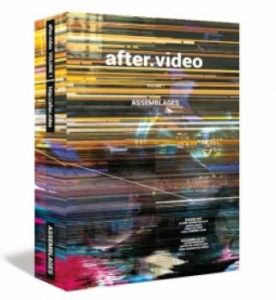 This exhibit and/or paper presents the after.video video book, discussing the topic of “Online and offline platforms for the exhibition and circulation of audiovisual media”. The after.video book represents a fusion of the modes of the digital/networked publication and the traditional form of the physical (wasted?) book. There have been first thoughts about the links and exchanges of the old traditional format of the book and the possible accordances of the digital book on a more practical level. The theoretical framing is given by thinkers of the book like Bob Stein: “the computer screen became a place for synchronous and asynchronous conversation. As web technology improved people started putting essays and books in a browser with a dynamic margin where readers could make comments visible to everyone. Over the past ten years the experience of dozens of ‘social reading’ platforms suggests that books will become places where people congregate to hash out thoughts and ideas.” (1). Practically this fusion of the possibilities and formats of new digital media (like video) and traditional academic text-form is also making headways – like exemplified in the ‘Frames of Mind’-project (2). Open Humanities Press has taken these beginnings and fused different pre-existing trajectories of development as instantiated by above projects and conceptions, and fused them with the idea of rendering the digital book after.video as a physical device, much along the lines already taken in the landmark project “The Weise7 in/compatible Laboratorium Archive” (3). This conceptual leap represented by the dual-mode video-book enables the Centre for Digital Cultures (4) and Open Humanities Press (5) to not only go beyond the format offered by the first two volumes of Video Vortex (as put out by the Institute for Network Cultures (6), but also beyond the current state of digital publishing in media-rich, video-centric contexts, thus presenting a unique publication which reflects upon video theoretically, but attempts to fuse form and content in its own dual format.
This exhibit and/or paper presents the after.video video book, discussing the topic of “Online and offline platforms for the exhibition and circulation of audiovisual media”. The after.video book represents a fusion of the modes of the digital/networked publication and the traditional form of the physical (wasted?) book. There have been first thoughts about the links and exchanges of the old traditional format of the book and the possible accordances of the digital book on a more practical level. The theoretical framing is given by thinkers of the book like Bob Stein: “the computer screen became a place for synchronous and asynchronous conversation. As web technology improved people started putting essays and books in a browser with a dynamic margin where readers could make comments visible to everyone. Over the past ten years the experience of dozens of ‘social reading’ platforms suggests that books will become places where people congregate to hash out thoughts and ideas.” (1). Practically this fusion of the possibilities and formats of new digital media (like video) and traditional academic text-form is also making headways – like exemplified in the ‘Frames of Mind’-project (2). Open Humanities Press has taken these beginnings and fused different pre-existing trajectories of development as instantiated by above projects and conceptions, and fused them with the idea of rendering the digital book after.video as a physical device, much along the lines already taken in the landmark project “The Weise7 in/compatible Laboratorium Archive” (3). This conceptual leap represented by the dual-mode video-book enables the Centre for Digital Cultures (4) and Open Humanities Press (5) to not only go beyond the format offered by the first two volumes of Video Vortex (as put out by the Institute for Network Cultures (6), but also beyond the current state of digital publishing in media-rich, video-centric contexts, thus presenting a unique publication which reflects upon video theoretically, but attempts to fuse form and content in its own dual format.
We also participated in the Liquid Democracy workshop, a report (in German) can be found here.
after.video @ LibreGraphics
Adnan presented the after.video project at the LibreGraphics conference.
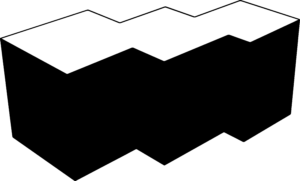 after.video is a new online service which will be making available a series of variably aged video presentations which cover a collection of topics. What it represents then is a repackaging (Assemblages) of material from a variety of sources, presumably professionally edited and augmented. If you visit their website, you see they are not quite operational, and that this is a paid subscription service.
after.video is a new online service which will be making available a series of variably aged video presentations which cover a collection of topics. What it represents then is a repackaging (Assemblages) of material from a variety of sources, presumably professionally edited and augmented. If you visit their website, you see they are not quite operational, and that this is a paid subscription service.
Now in its 11th year, the international Libre Graphics Meeting turns its focus for 2016 to the theme “Other Dimensions”, encompassing time-based media and the third dimension, new additions to LGM’s established focus on graphics.
From its first edition in 2006, held in Lyon, France, Libre Graphics Meeting has been a locus for software contributors, artists, designers, and users to come together and share their knowledge and to experience camaraderie. This year will see four days of presentations, talks, hacking sessions, workshops, and meetings.
Prominent software projects such as GIMP, Inkscape, Scribus, GNOME, and others will come together to demonstrate the progress on their projects and to discuss them within the context of the larger Libre Graphics community. LGM 2016 will play host to animators, architects, artists, book designers, cartographers, developers, documenters, educators, engravers, graphic designers, git visualizers, hackers, photographers, rasterizers, reverse engineers, tool makers, type designers, and video archivers (among others!).
The 2016 edition of LGM will have a full program of workshops, presentations and talks across the entire spectrum of Free/Libre and Open Source graphics projects and communities. The full program can be found online http://libregraphicsmeeting.org/2016/wp/wp-content/uploads/2016/03/LGM2016program.pdf
With a great after party: Autonomous Tech Fetish & also check out Lara’s project dataunion.
The next LibreGraphics meeting will be in Rio De Jaineiro.
Cyberparty: popular politics in digital times
In recent years – and in particular since the explosion of the financial crisis of 2008 – we have witnessed the rise of an array of new political parties – sometimes described as ‘digital parties’, ‘internet parties’ or ‘network parties’ – that attempt to utilise digital communication technologies as means to construct new forms of political participation and organisation against a background of widespread political disaffection with mainstream politics.
From the 5 Star Movement in Italy, to Podemos in Spain, and the Pirate Party in Iceland, Sweden and Germany, to the municipalist formations that recently won the mayoralties of Barcelona and Madrid, the signs of this surprising revival of the political party in digital times are growing. These new political organisations that are entering the political arena in a number of countries in Europe and beyond make use of the tools and practices that typify the present digital era, from Twitter channels and Facebook pages to Whatsapp groups and decision-making platforms. Furthermore, they embody the new demands that reflect the ways of life, fears and desires of an era of mass digital connectivity: demands for free information, privacy, connectivity and basic income.
What is the meaning and what the implications of these emerging digital parties? How do they reflect and respond to the current phase of economic and political crisis? What are the new issues and policies they bring to the fore? What are their forms of organisation, participation and leadership?
The Cyberparty conference hosted by the newly formed Centre for Digital Culture at King’s College London will explore these issues by bringing together experts and activists from the forefront of political innovation. It will ask what is specific to the emerging ‘digital party-form’ underpinning these formaions, how it compares with the mass parties of the industrial era and the electoral-professional parties of the neoliberal era and to what extent it can become a vehicle for social and political change. Furthermore, it will inquire in which ways more traditional political phenomena such as the Labour party under the leadership of Jeremy Corbyn and Bernie Sanders’ campaign in the US are trying to adopt some of the emerging organisational structures and practices coming from digital parties.
Different aspects of digital parties will be examined: their forms of communication and propaganda; their decision-making platforms; their policy platform and social base, with dedicated panels on these issues.
The conference will also host a special panel on digital activism in Eastern Europe.
Initiatives for open democracy and a decentralised internet
During the past two years, D-CENT (Decentralised Citizens ENgagement Technologies) has been working to transform democracy in a very concrete way: helping movements, cities, and political parties to build technologies, methods and tools that can make the democratic system more in-sync with collective aspirations of the 21st century.
To showcase and celebrate the results of the D-CENT project a week-long programme of activity is taking place from the 23-28 May in Madrid, Spain. Full details can be found at www.dcentproject.eu/dcentmadrid.
As part of the Democracy Lab we are holding an open call for groups and individuals to contribute to a two-day unconference Initiatives for open democracy and a decentralised Internet (25th and 26th May) looking at privacy-aware, open source democracy tools and citizen empowerment through bottom-up participation.
We’re inviting technologists, activists, journalists, policy-makers, civil servants, academics, lawyers, designers and startups to come together to showcase their work, demo products, debate and plan.
The two-day event will be run in an “unconference” format and will include lightning talks, hands on workshops and presentations selected and scheduled by attendees on the day.
Nervous Systems
!Mediengruppe Bitnik exhibits the Assange Room at HKW.
Can our inner thoughts be transmitted by our eye movements? Can our future actions be predicted by our current behavior? Julien Prévieux’s film Patterns of Life enacts more than a century of evolving technologies in tracking human behavior, from reorganizing the factory floor to today’s “activity-based intelligence” in the “war on terror.” This is but one example from over 30 works tracing the inversions that mark the relationship between man and machine. Co-curated by Stephanie Hankey and Marek Tuszynski from the Tactical Technology Collective and Anselm Franke the exhibition showcases a range of reflections on our quantified society and the processes of self-quantification. Historical artworks call for a reinterpretation of early conceptual art’s concern with quantification, its “aesthetics of bureaucracy,” and the deconstruction of the self in light of current data- collection. The exhibition includes contributions by media historians and writers, reconstructing the history and the present rise of data-technologies and portraying the world they bring about. A live installation—conceived by Tactical Tech—offers an active space in which visitors can explore their own digital traces. This White Room combines selected artworks, digital products, investigations, and activist projects with discussions, consultations, and demos exploring the devices we use every day, and how we can regain some control over our data.
after.video @ Transmediale
We held a reception for our soon to be published video book: after.video at the Transmediale Festival.
Seeing Power—What About That?
with: 2/5BZ + after.video collective
Reception/Presentation + Performance
Sat, 06.02.2016 | 20:00 – 21:30 | Cafe Global Stage
part of Stream: Anxious to Act
see here for event-link
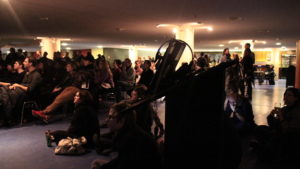
New global power complexes demand new multi-sensory ways of seeing power and sensing one’s own position in it: new sets of sensory politics. Following the concept of “altered states”—a geopolitics spectralized by sensory overload and dispossession and by the relocation of power in the post-democratic or post-digital era—the performance GEZILLA DESTROYS ISISTANBUL will reconsider what is (or was) referred to as Europe. It will also engage the Golden Age Global Hologram Doctrine, Isistanbul, and Anxt Hase States, and feature modern isolation tanks as part of the new inventory of “hardcore ultra modernism.” Isistanbul is also the title of a video-essay by Serhat Köksal, included in the upcoming after.video/assemblages, which is the first issue of a new hybrid “video-book” series by Open Humanities Press.
– The transmediale performance of 2/5BZ will be preceded by an open reception by the after.video collective.
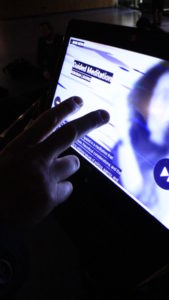 This year’s topic of the Transmediale festival was Conversations. The format of transmediale/conversationpiece is not like past festivals: instead of a singular theme with static exhibition and program structures, artistic and research practice will unfold live through a variety of talks, discussions, lectures, workshops, and experimental hybrid formats. Due to the exchange-based nature of the events, many will be registration-only, allowing for a limited number of participants to engage in rigorous discussion and collaboration. Four thematic streams serve as an organizing principle for the conversations and presentations: Anxious to Act, Anxious to Make, Anxious to Share, and Anxious to Secure.
This year’s topic of the Transmediale festival was Conversations. The format of transmediale/conversationpiece is not like past festivals: instead of a singular theme with static exhibition and program structures, artistic and research practice will unfold live through a variety of talks, discussions, lectures, workshops, and experimental hybrid formats. Due to the exchange-based nature of the events, many will be registration-only, allowing for a limited number of participants to engage in rigorous discussion and collaboration. Four thematic streams serve as an organizing principle for the conversations and presentations: Anxious to Act, Anxious to Make, Anxious to Share, and Anxious to Secure.
As Deckspace Medialab & former Resync.UG members James & Adnan took part in the Off Network series. Furtherfield has a nice writeup here, plus a blog post on speculating the Smart Metropolis.
I took a note of the following conversations.
Thursday:
Acknowledging a critical moment for diverse port authorities worldwide and at a new global juncture—in Berlin, the EU, and many other international ports—this gathering will be focused specifically on reviewing traditional ports, gathering concrete engagements with their inherent and continuing political-logistical promise of connecting people, places, and important matters. With a mandate to re-establish a communal quality of ports, the Global Port Authority will ask: what docking points could in these moving times provide reliable anchorage, refuge, or sanctuary to a globally distributed ecology of commoning initiatives and people anxious for open interplanetary connectivity? What are the criteria, methods, and practices for attaining open ports?
Communication and travel networks that open the world to us are the characteristics of globalization. At the same time we feel increasingly isolated, controlled, and threatened by those global systems. How can we react to or modify our dependence upon them? The term “structural power” is used in political theory to analyze the systematic exclusion and repression of minorities. In reference to that concept, this seminar will trace how “infrastructural power” shapes and structures today’s communicative and social foundations.
Today, WikiLeaks is building an unprecedented library consisting of millions of leaked documents, thereby advancing a seminal world heritage form. Its immediate prehistory as well as its latest offspring will be investigated in the Tacit Futures dialogues. Participants will explore Cryptome.org, which is widely considered the precursor of digital leaking platforms, and which has been the first organization to start systematically collecting Snowden documents. Moreover the discussion will dive into projects building Snowden archives such as the Snowden Document Search, the Snowden Digital Surveillance Archive, and the Snowden Archive-in-a-Box. Bringing together pioneering archivists of the files leaked by Snowden, this round table is a culturally significant world premiere, aiming to reflect the motivations and challenges experienced by each initiative.
Tactical media were identified in the 1990s as a distinct cluster of critical practices at the intersection of art, political activism, and technological experimentation. Tactical media are participatory forms of politicized self-mediation that give voice to the marginalized and excluded. There has always been a deeply troubling, uneasy and strenuous relationship between tactical media and archives. Archives, which are traditionally conceived as capturing living moments and turn them into historical events, as such would constitute the very opposite of tactical media’s dynamic nature. As a result of their resistance to archiving, the proponents of tactical media have succumbed to a severe form of memory loss, making critical reflection difficult. This is a high price to pay.
Friday
Reprogramming the Internet of Things
This panel critically addresses the prevailing vision of the Internet of Things (IoT) as a top-down mega-infrastructure of interconnected every-things, in an attempt to articulate viable bottom-up alternatives. Practices and methodologies for tweaking, disrupting, and appropriating existing infrastructures will be discussed, bringing to the foreground smaller-scale systems and networks of sensing devices, computational artifacts, and humans, to address issues of importance for the everyday life of the user and the local community. The panelists will ask whether such systems and interventions can become sustainable through enhancing citizens’ literacy on the use and appropriation of IoT technologies and sensor networks.
The Pirate Book offers a broad view on media piracy as well as a variety of perspectives on recent issues and historical facts on the topic. It contains a compilation of texts on grassroots strategies to share, distribute, and experience cultural content outside of the confines of local economies, politics, or laws. These stories recount the experiences of individuals from India, Cuba, Brazil, Mexico, Mali, and China. The book is structured in four parts, beginning with a historical piracy stories dating back to the invention of the printing press and then expanding to broader issues, such as modern anti-piracy technologies, geographically specific issues, and the rules of the Warez scene (distribution of copyrighted works for free), along with its charters, structure, and visual culture.
Dispute Plan to Prevent Future Luxury Constitution by Benjamin H. Bratton
Please join Benjamin H. Bratton and e-flux journal editor Julieta Aranda for the launch of Bratton’s new work of theory-fiction, Dispute Plan to Prevent Future Luxury Constitution. The title also marks the tenth book in the e-flux journal Series with Sternberg Press. Benjamin H. Bratton’s kaleidoscopic theory-fiction links the utopian fantasies of political violence with the equally utopian programs of security and control. Both rely on all manner of doubles, models, gimmicks, ruses, prototypes, and shock-and-awe campaigns to realize their propagandas of the deed, threat, and image. Blurring reality and delusion, they collaborate on a literally psychotic politics of architecture. In this mosaic we glimpse a future city built with designed violence and the violence of design. As one ratifies the other, the exception becomes the ruler. Presented in cooperation with e-flux.
Saturday
Book Launch: Networked – A Media Genealogy of the Network Society by Clemens Apprich
Many technologies and practices that have shaped today’s Web 2.0 date back to the 1990s—and so do the ideas of social media, user-generated content, and participatory platforms. From a media-historical perspective, a lot of the ideas from that period about the future of the internet have indeed been implemented, albeit without fulfilling the envisioned socio-political utopias. In his new book, Clemens Apprich explores the history of an alternative web discourse and develops a media genealogical understanding that is necessary to think beyond today’s predominant concept of socio-technical networks and to intervene in current debates about the Internet.
“In case you hadn’t noticed, these days a lot of the world is in some form of rebellion, insurrection, or protest,” wrote Rebecca Solnit in 2012, a year after a barrage of movements symbolically grouped around the Arab Spring erupted. These “post-2011” events challenged the sometimes simplistic narratives of the “post-911” world. What linked the events in this cycle of struggles was not organizational coherence but rather a shared global sentiment mediated by a new form of global sensorium. Social energies headed “back to the streets,” bringing up questions about the consequences of physical exposure, organization, strategy, fragmentation, and violence. New media became double-edged weapons, used for and against emancipation. While after 2011 there were some attempts to decipher these “signs from the future,” as Žižek has put it, now in 2015 it seems that the “global moment” has ended.
The choice to go “off the cloud” stems from current disillusionment with networked connectivity, reaching instead for the potential of emerging user-owned and user-controlled infrastructures. Over the last decade a growing scene of artists, hackers, and network practitioners has been actively working on creating community networks, ad-hoc connectivity, and autonomous systems of sensing and data collecting. But how feasible are the changes these groups want to see? Following last year’s offline networks unite! panel at transmediale and several specially organised workshops, Off-the-Cloud Zone brings together various actors to discuss the challenges, barriers, and possibilities of the field. With open conversation formats and hands-on demonstrations, the event seeks new strategies of joining forces and building common tools to take users beyond the sovereignty of the cloud. Organized in collaboration with the MAZI project.
Translating the Hyper-visible and the Invisible
Within the last year the artist Alona Rodeh has published Safe and Sound, a collection of texts by invited authors on the audiovisual methods of safety and security, from which Rodeh created a series of visual responses. In the same year, Mario de Vega, Victor Mazón Gardoqui, and Daniela Silvestrin have published the book LIMEN, which invited a series of authors to write about the electromagnetic spectrum in response to de Vega’s sound work on invisibility and his collaborations with Gardoqui. Taking these two publications as starting points, this conversation between the authors and the curator and designer Carsten Stabenow will reflect on artist-led publications and research processes and the aesthetics of print media as a means to communicate ideas on sound, visual art, and contemporary social issues.
New global power complexes demand new multi-sensory ways of seeing power and sensing one’s own position in it: new sets of sensory politics. Following the concept of “altered states”—a geopolitics spectralized by sensory overload and dispossession and by the relocation of power in the post-democratic or post-digital era—the performance GEZILLA DESTROYS ISISTANBUL will reconsider what is (or was) referred to as Europe. It will also engage the Golden Age Global Hologram Doctrine, Isistanbul, and Anxt Hase States, and feature modern isolation tanks as part of the new inventory of “hardcore ultra modernism.” Isistanbul is also the title of a video-essay by Serhat Köksal, included in the upcoming after.video/assemblages, which is the first issue of a new hybrid “video-book” series by Open Humanities Press.
Still Be Here is a unique collaborative performance that draws us into the multiplying realities of a 21st Century pop star, and traces the dynamics at play between fans, corporations, and social desires. Since her 2007 launch in Japan, Hatsune Miku (whose name means “first sound of the future”) has become the ultimate pop star, developed from a vocal synthesizer product into a globally adored and collaboratively constructed cyber celebrity with a growing user community, countless stadium performances as a virtual 3D projection, and more than 100,000 songs released worldwide.
Sunday
Acknowledging a critical moment for diverse port authorities worldwide and at a new global juncture—in Berlin, the EU, and many other international ports—this gathering will be focused specifically on reviewing traditional ports, gathering concrete engagements with their inherent and continuing political-logistical promise of connecting people, places, and important matters. With a mandate to re-establish a communal quality of ports, the Global Port Authority will ask: what docking points could in these moving times provide reliable anchorage, refuge, or sanctuary to a globally distributed ecology of commoning initiatives and people anxious for open interplanetary connectivity? What are the criteria, methods, and practices for attaining open ports?
Archive, Curate, Educate: Active Media Arts
The archive is unbound, no longer restricted to a space of storage or a logic of cultural memory. Today the archive is also a site of sharing, distribution, education, critique, imagination, and artistic activity. This panel brings together curatorial, artistic, and academic perspectives on media art in order to discuss the role archives can play in curation, spatial design, and technology-based art practice. The panelists will discuss examples such as Erkki Kurenniemi’s archival and technological art, artistic projects with the Asger Jorn Archive, and other innovative examples of ways the archive continues to be reimagined. Also at stake are how archives can feed into (media arts) education. How does the archive shift when it becomes an active online environment that can work against reification of knowledge?
How do we trust each other online? Do we need to see each other’s eyes? Or do we need to touch? Tele_Trust is a performance-installation for an intimate networking body experience. The presentation creates an engaging agora, researching new parameters for online trust. It presents participants with a paradox: while in our changing social ecosystem we increasingly demand transparency, we cover our bodies with personal communication technology. Participants will meet in a wearable DataVeil, a tangible body interface functioning as a second skin and membrane for “scanning” online trust.
In our mad rush to 3D-print the world (again), we have ignored a few important things: the necessity of physical traction and engagement with materials in creative processes, the realities of material resource chains, and the homogenization and functionalization of once-radical grassroots subcultures and communities. We are all now, somewhat paradoxically, makers and hackers, using kits (prescribed solutions) to develop supposed novelties, using off-the-shelf DIY to do battle with a hegemony that continuously chips away at our laser-cut armor. As part of an afternoon discussion session, participants and the general public are invited to an open conversation about the birth, death, and reconstitution of maker and hacker cultures. Should we all just stop making—or start unmaking? Unmaking as breaking, unmaking as refusal, unmaking as…? Following the event, a summary publication (as a “kit”) will be issued, presenting results.

